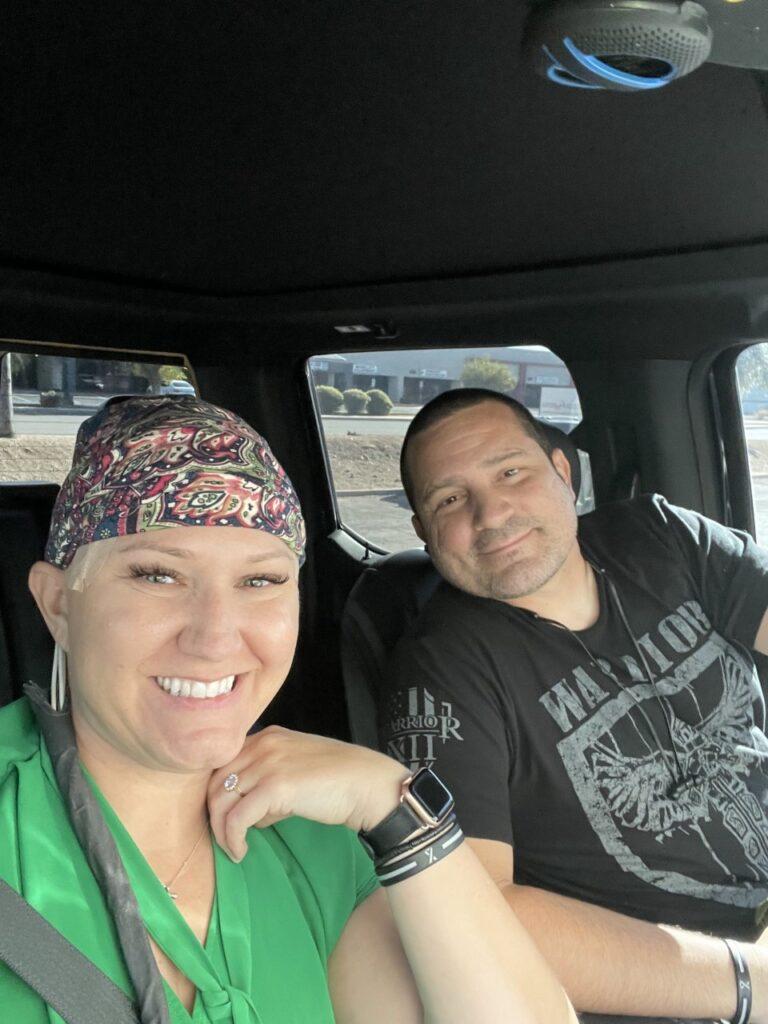
Ivy Blog
Restoring Intimacy After Brain Cancer
- February 13, 2023
- Ivy Center
- Posted in Patient Support

A brain tumor diagnosis brings many changes to a relationship. Intimacy after brain cancer is uncharted territory many couples don’t know how to navigate.
After being diagnosed with a brain tumor and undergoing surgery, radiation and chemotherapy, Jenn Ortiz felt like a changed woman. She felt different and, with a surgical scar, physical deficits and a shaved head, she looked different.

She apologized to Matt for not being the woman she once was. He didn’t see it that way. She was the same funny, caring, full-of-life woman she always was. Cancer was an obstacle they would overcome.
Relying on the chemistry they’ve always had and accepting the changes cancer forced, Jenn and Matt have learned how to keep the spark alive. They go on romantic vacations, regular date nights and make time to talk daily. Even running errands together is time they don’t take for granted.
Jenn, a glioblastoma survivor, advises couples to learn about each other and what each partner needs in this season. She recommends reading The 5 Love Languages by Gary Chapman. Matt’s love language is “words of affirmation” and Jenn scores high in all the categories.
Intimacy after diagnosis
Intimacy and sexuality are areas of life that are private and might be uncomfortable to talk about, says Norissa Honea, PhD, RN, program manager in Oncology Clinical Research at the Dignity Health Cancer Institute at St. Joseph’s Hospital and Medical Center. Navigating those sensitive topics with your spouse or partner is important to best prepare for and handle the challenges that lie ahead in brain cancer treatment and recovery.
Changes to a patient’s body and mind after cancer treatment can become an obstacle in the bedroom. A loss of sexual function or reduced libido can be difficult to accept and physical changes, such as hair loss and weight gain or loss, may make a patient feel less attractive or uninterested in intimacy. Treatment may also affect mood, energy and hormone levels, which also impacts intimacy.
Intimacy doesn’t always mean sex. There are other ways to maintain closeness without sex, like holding hands or giving a massage.
Caregivers can also face their own challenges with intimacy. The distress and grief of the diagnosis, in addition to caregiving duties, can weigh heavily on a spouse or partner. When a spouse assumes the caregiver role, the relationship changes.
In a presentation titled “Getting Your Groove Back: Intimacy After Diagnosis,” Honea describes the three domains of intimacy. They are:
- Connectedness, which includes companionship, affection and protection.
- Touch, sexual and non-sexual
- Mutual sharing of beliefs and goals
These domains should be reciprocal and exchanged between the two spouses, partners, caregivers or survivors.
Strive to not let the illness weaken the bond between you and your partner
Norissa Honea, Program Manager in Oncology Clinical Research
Getting your groove back
To restore intimacy, Honea recommends filling the voids felt in the relationship. Here are some tips:
- Share small moments together like a morning cup of coffee or watching a favorite show
- Create regular routines to make time for moments together
- Communicate – explain to your partner how you’re feeling, it’ll clear up any misconceptions and help each partner understand the other’s point of view
- Talk to your doctor and learn how your treatment will affect your body and why
- Talk and reminisce about your life and relationship and enjoy each other’s company
- Ask for what you need – a hug or quality time – and say, “I love you.”
Honea recommends a mindful intimacy exercise called 7 Minutes in Heaven. The exercise has couples stand face-to-face, holding hands with eyes closed, paying close attention to each other’s breathing. Feel your partner’s hands in yours. Do some heart exploration together, noticing the rhythm of your heartbeat and sensing your partner’s. This exercise can progress in any direction and lead to more emotional and physical intimacy.
While intimacy looks different for every couple, it’s important to figure out what works for your relationship. Maintaining a strong bond with your partner will help navigate the changes that will inevitably come in a brain cancer journey.
For more information and support, the Brain Tumor Patient and Caregiver Education guide offers videos on a variety of topics. Each symposium video features a clinician and shares the latest treatments, symptom management and other educational information.
